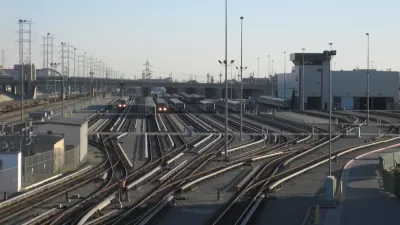The National Transportation Safety Board called on federal regulators on Jan. 23 to approve several measures in light of a rash of oil train derailments and crude oil explosions as did their Canadian counterparts, the Transportation Safety Board.
The National Transportation Safety Board (NTSB), an independent safety investigation agency charged by Congress to investigate significant accidents, can not make regulations; they can only recommend them. The Pipeline and Hazardous Materials Safety Administration (PHMSA) and the Federal Railroad Administration, both located within the U.S. Department of Transportation (DOT) are two key federal regulators that have the authority to approve recommendations suggested by NTSB after they assisted Canada's Transportation Safety Board in a comprehensive investigation of the July 6 oil-train derailment and conflagration in Lac-Mégantic, Quebec. The joint recommendations of the two nations' safety boards are unprecedented.
"Railroads, energy companies, refiners and shippers have been at odds over how to solve the safety issues that have arisen from surging oil production in the Bakken Shale," write Betsy Morris, Paul Vieira and Laura Stevens, as was evident when key industry players came together last week with DOT Secretary Anthony Foxx to agree on voluntary, preventative measures. Key lobbying groups are the American Association of Railroads (AAR) and the American Petroleum Institute (API). NTSB's recommendations (see their press release) include:
- (T)ansportation regulators should work with railroads to reroute oil trains and should ensure that railroads have plans in place to handle "worst-case" accidents or spills.
- PHMSA should "require shippers not only to test but to document the physical and chemical characteristics of their hazardous shipments [referring to Bakken Shale crude which has been shown to be more explosive than heavier crudes]".
While NTSB did not offer new recommedations on oil tanker rail cars, referring to earlier ones made in March, the Transportation Safety Board of Canada did address shortcomings of early DOT-111 cars. [See their press release.]
Industry reactions were mixed. While AAR said it was in "in full agreement" (see press release), API appeared to defer responsibility to the railroads. "(T)he first step is to prevent derailments by addressing track defects and other root causes of all rail accidents," it said in a statement. Coincidentally, the Federal Railroad Administration on Jan. 24 issued its "Final Rule to Improve Rail Inspections."
The Canadian Pacific railroad issued a statement for Valley News (Fargo/Grand Forks) that showed the role of the different parties in crafting new safety rules.
"This is a complex multi-faceted issue requiring extensive collaboration between regulators, the railways that own the locomotives and tracks, shippers which supply the tank cars and the producers of the product."
On a related note, Keystone XL pipeline backers pointed to the NTSB recommendations to support a planned spur from North Dakota to their pipeline that could carry up to 100,00 barrels of oil a day, about one tenth of the state's daily production. Most of the remainder will continue to use rail transport.
Listen to "Living on Earth"'s comprehenve interview with Globe and Mail reporter, Jacquie McNish, on the joint safety board recommendations and an excellent history of transporting crude-by-rail.
FULL STORY: Safety Board Calls for Tougher Standards for Shipping Crude Oil by Rail

Alabama: Trump Terminates Settlements for Black Communities Harmed By Raw Sewage
Trump deemed the landmark civil rights agreement “illegal DEI and environmental justice policy.”

Study: Maui’s Plan to Convert Vacation Rentals to Long-Term Housing Could Cause Nearly $1 Billion Economic Loss
The plan would reduce visitor accommodation by 25% resulting in 1,900 jobs lost.

Planetizen Federal Action Tracker
A weekly monitor of how Trump’s orders and actions are impacting planners and planning in America.

Wind Energy on the Rise Despite Federal Policy Reversal
The Trump administration is revoking federal support for renewable energy, but demand for new projects continues unabated.

Passengers Flock to Caltrain After Electrification
The new electric trains are running faster and more reliably, leading to strong ridership growth on the Bay Area rail system.

Texas Churches Rally Behind ‘Yes in God’s Back Yard’ Legislation
Religious leaders want the state to reduce zoning regulations to streamline leasing church-owned land to housing developers.
Urban Design for Planners 1: Software Tools
This six-course series explores essential urban design concepts using open source software and equips planners with the tools they need to participate fully in the urban design process.
Planning for Universal Design
Learn the tools for implementing Universal Design in planning regulations.
Caltrans
Smith Gee Studio
Institute for Housing and Urban Development Studies (IHS)
City of Grandview
Harvard GSD Executive Education
Toledo-Lucas County Plan Commissions
Salt Lake City
NYU Wagner Graduate School of Public Service



























